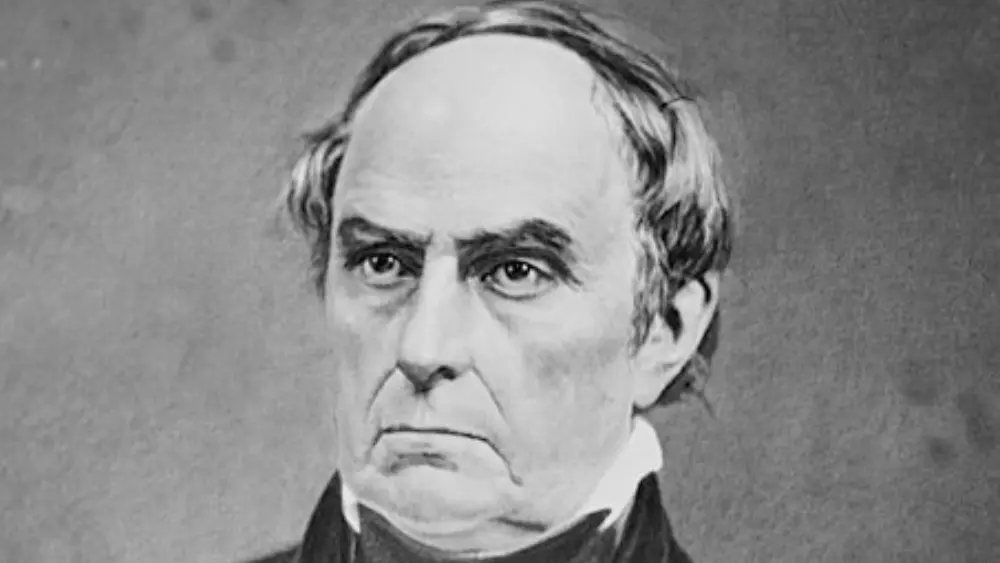Daniel Webster, born on January 18, 1782, in Salisbury, New Hampshire, is one of the most renowned statesmen in American history. With a towering intellect, eloquence, and a distinguished political career, Webster made lasting contributions to the United States as a statesman, orator, and diplomat.
Early Life and Education
Daniel Webster’s youth in a farming family ingrained in hard work and deep respect for education, shaping his character and future. In this setting, he absorbed a robust work ethic that fueled his life’s endeavors continually. Moreover, his family’s emphasis on education set the stage for his future accomplishments.
Following his formative years, Daniel Webster’s journey in pursuit of knowledge continued as he attended Phillips Exeter Academy. This initial step paved the way for his academic aspirations, culminating in his graduation from Dartmouth College in 1801. His early education set the foundation for a remarkable law and politics career, hinting at a promising future of dedication to public service in American history.
Daniel Webster: Lawyer and Orator
After legal studies, Daniel Webster had a distinguished career as a lawyer and orator. Establishing his law practice in Portsmouth, New Hampshire, he gained acclaim for outstanding legal skills and remarkable eloquence. Webster’s courtroom skill and clear articulation of complex legal arguments solidified his reputation as a brilliant legal mind.
Yet, it wasn’t just his legal prowess that set him apart. Webster’s gift for oratory was equally renowned. His persuasive skills and legal acumen captivated audiences, proving vital in his later political pursuits. Transitioning into politics, these skills propelled him to national prominence, solidifying his legacy as one of America’s influential statesmen and orators.
Congressional Career Begins
Daniel Webster’s entry into American politics was a turning point in his career. In 1813, he took on a crucial role as a representative of New Hampshire in the U.S. House of Representatives. It was in this position that he began a journey that would go on to shape the nation’s history in profound ways.
In the House, Webster vocally supported economic policies favoring business and manufacturing interests during his tenure. His support for protective tariffs earned him the moniker “Black Dan.” This nickname symbolized his commitment to policies aimed at safeguarding American industries and fostering economic growth. Webster’s early congressional career highlighted principles defining his enduring legacy, extending well beyond the House of Representatives’ confines.
Daniel Webster: Senate Giant
In 1827, Daniel Webster’s political trajectory reached a new pinnacle when he was elected to represent Massachusetts in the U.S. Senate, a position he would hold for multiple terms. Within the Senate’s chambers, Webster became an American political giant, cementing his stature in the nation’s political landscape. His tenure in this esteemed body was marked by a relentless commitment to addressing matters of profound national significance.
Daniel Webster’s presence in the Senate was nothing short of commanding. Renowned for impassioned speeches, he tackled crucial issues like Union preservation and staunch defense of constitutional principles with eloquence. His debates with Senator Hayne over states’ rights and nullification are iconic, displaying his unmatched ability to articulate and defend foundational principles. Daniel Webster’s Senate legacy was built on dedication to the USA’s betterment and relentless pursuit of a more perfect union.
Secretary of State and Diplomatic Achievements
Daniel Webster’s appointment as Secretary of State in 1841 marked a significant phase in his illustrious career. Initially appointed by President Harrison and continuing under President Tyler, Webster brought his intellect and diplomacy to American foreign policy. Notably, he negotiated the 1842 Webster-Ashburton Treaty, a landmark treaty resolving long-standing border disputes between the United States and Canada.
The Webster-Ashburton Treaty showcases Daniel Webster’s diplomatic skill and dedication to North American peace and stability preservation. Webster’s negotiations effectively resolved longstanding boundary issues, easing tensions between the U.S. and Britain that spanned years. His diplomatic feat displayed his international finesse and bolstered diplomatic ties between the United States and Great Britain.
Daniel Webster: Second Term as Secretary of State
Daniel Webster’s return as Secretary of State in 1850, under President Fillmore, marked a pivotal chapter in his political career. In his second term as Secretary of State, Webster faced a nation divided over slavery’s expansion into newly acquired territories. In this turmoil, he played a key role in crafting the 1850 Compromise, aimed at easing tensions between slave and free states.
Webster’s role in the 1850 Compromise showed his dedication to preserving the Union and seeking peaceful resolutions to contemporary issues. Advocating for compromise amid strong slavery debate opinions, he showed dedication to preserving the United States’ integrity, despite personal beliefs. Although the Compromise had mixed long-term results and could not ultimately avert the looming Civil War, Webster’s efforts in this critical moment of American history underscored his reputation as a statesman who prioritized the unity of the nation above all else.
The Seventh of March Speech
Daniel Webster’s “Seventh of March Speech,” delivered in 1850, remains a defining moment in his political career and American history. In this speech, he made a compelling argument in favor of the Compromise of 1850, positioning it as a critical measure to preserve the Union amidst the escalating tensions between North and South over the issue of slavery. Webster’s oratory skills were on full display, and his speech was lauded for its eloquence and the force with which he articulated his belief in the necessity of compromise.
However, the “Seventh of March Speech” was not without controversy. While it earned Webster praise from those who sought to maintain the Union at all costs, it also drew vehement criticism from abolitionists and anti-slavery advocates. They viewed his support for certain provisions of the Compromise, such as the Fugitive Slave Act, as a betrayal of the anti-slavery cause. The speech revealed the deep divisions within the nation on the issue of slavery and demonstrated the complexities of Webster’s political career as he navigated the treacherous waters of a deeply polarized society.

Daniel Webster: Legacy and Influence
Daniel Webster’s legacy in American politics and jurisprudence is nothing short of profound. Throughout his storied career, he championed the Union’s fundamental importance and steadfastly upheld the principles enshrined in the Constitution. His impact on American political thought can hardly be overstated, as he stood as a resolute defender of the nation’s unity and the principles upon which it was founded.
Webster’s enduring influence can be found in the enduring relevance of his speeches and legal arguments. His oratory skills and clarity of thought continue to serve as a model for aspiring politicians, lawyers, and advocates. His ability to persuade and articulate complex ideas with conviction is celebrated to this day. Whether in his efforts to preserve the Union, his contributions to constitutional interpretation, or his powerful speeches on matters of national importance, Daniel Webster’s legacy remains an enduring source of inspiration and a testament to the enduring impact one dedicated statesman can have on the course of a nation’s history.








